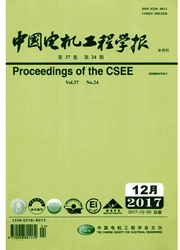

 中文摘要:
中文摘要:
控制性能标准(controlperformancestandard,cps)下互联电网调度端的自动发电控制(automaticgenerationcontrol,AGC)指令(简称CPS指令)到各类型AGC机组的动态优化分配是随机最优问题。将CPS指令分配的连续控制过程离散化,并可将其看作是一个离散时间马尔可夫决策过程,提出应用基于。-学习的动态控制方法。根据优化目标的差异,设计不同的奖励函数,并将其引入到算法当中,有效结合水、火电机组的调节特性,并考虑水电机组的调节裕度,提高AGC系统调节能力。遗传算法和工程实用方法在标准两区域模型及南方电网模型的仿真研究显示,Q-学习有效提高了系统的适应性、鲁棒性和CPS考核合格率。
 英文摘要:
英文摘要:
The dynamic optimization of automatic generation control (AGC) order allocation based on the NERC's control performance standard (CPS) is a problem on stochastic optimization in the AGC system for the interconnected power system. The CPS order allocation was discretizcd and viewed as a discrete time Markov decision process (DTMDP). The dynamic control method based on Q-learning was proposed. Reward functions in Q-learning were designed based on different optimization objectives. Thermal and hydro units were integrated, with the regulating margin for hydro units being considered, toimprove the regulating performance of the AGC system. The application of the Q-learning algorithm in the two-area load frequency control (LFC) model and China southern power grid model was presented, compared with the genetic algorithm and an engineering method. The case study shows that the Q-learning algorithm can enhance the robustness and adaptability of AGC systems in CPS assessment.
 同期刊论文项目
同期刊论文项目
 同项目期刊论文
同项目期刊论文
 Stochastic Optimal CPS Relaxed Control Methodology for Interconnected Power Systems Using Q-Learning
Stochastic Optimal CPS Relaxed Control Methodology for Interconnected Power Systems Using Q-Learning Stochastic optimal generation command dispatch based on improved hierarchical reinforcement learning
Stochastic optimal generation command dispatch based on improved hierarchical reinforcement learning 期刊信息
期刊信息
